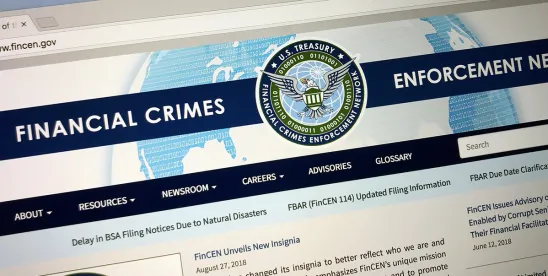The Corporate Transparency Act (the “CTA”) imposes a new obligation on many business entities, including Limited Liability Companies, Limited Partnerships, and Corporations formed or registered to do business in the United States, to disclose their “beneficial owners” and “company applicants” to the Financial Crimes Enforcement Network (“FinCEN”), a bureau of the U.S. Department of Treasury. In the case of an entity owned by a Trust, the Trustees, and in some cases the beneficiaries, may be “beneficial owners” who must be disclosed. Entities formed before January 1, 2024, must file by January 1, 2025. Entities formed during 2024 must generally file within 90 days of formation, while entities formed in 2025 or later must generally file within 30 days of formation.
The CTA imposes criminal and civil penalties for any person who willfully provides, or attempts to provide, false or fraudulent beneficial ownership information to FinCEN or willfully fails to report, complete, or update beneficial ownership information to FinCEN. It is unlawful for any person to willfully provide, or attempt to provide, false or fraudulent beneficial ownership information, including a false or fraudulent identifying photograph or document, to FinCEN or to willfully fail to report, complete, or update beneficial ownership information to FinCEN. The term “person” includes any individual, reporting company, or other entity. The term “beneficial ownership information” includes any information provided to FinCEN pursuant to the CTA.
It is important to note that if Blank Rome formed an entity for a client prior to 2024, our representation did not include legal advice or services related to the CTA. Therefore, if you would like our advice on whether your company must file or if you would like our assistance in registering your company, please contact your Blank Rome attorney as soon as possible, particularly if you have a business entity formed prior to 2024 that has not yet filed.
The purpose of the CTA is to help prevent and combat money laundering, terrorist financing, corruption, tax fraud, and other illicit activity. Disclosure reports submitted under the CTA will not be generally available to the public but will be available to certain other government agencies, including the Internal Revenue Service.
The CTA represents a paradigm shift in the United States. There will be new beneficial ownership reporting obligations that will be a routine part of the entity formation process. But the numerous exemptions and categories of beneficial owners under the CTA can make this analysis nuanced and complex based on individual circumstances. Entities and individuals with questions about the CTA should consult with counsel to understand their new reporting obligations.
Reporting Company
An entity is subject to the CTA if it is a “reporting company” as defined under the CTA. A “reporting company” is generally either a U.S. domestic entity created by filing a document with a secretary of state (or similar government office), as, for example, corporations and limited liability companies are, or an entity that was formed under the laws of a foreign country that registered to do business in a U.S. state by filing a document with a secretary of state or similar government office. Examples of entities that are not reporting companies under the CTA are general partnerships or sole proprietorships because such entities are not formed by filing a document with a state office.
A reporting company may be exempt from reporting if it meets one of the 23 exemptions described in the CTA. Examples of notable exemptions include large operating companies, subsidiaries of certain exempt entities, or inactive entities. In general, under the CTA a large operating company is an entity with five million dollars or more in gross receipts or sales (net of returns and allowances) that employs more than 20 full-time employees in the United States and has a physical operating presence in the United States. But there are specific criteria for each exemption that will require an analysis by counsel familiar with the CTA.
Beneficial Owners
All reporting companies must report their beneficial owners under the CTA. A beneficial owner is generally any individual, including the Trustee of a Trust and, in some cases, the beneficiaries of a Trust, who, directly or indirectly, (i) exercises substantial control over a reporting company or (ii) owns or controls at least 25 percent of the ownership interests of a reporting company. Examples of substantial control over a reporting company include an individual who is a senior officer or has appointment or removal authority over the reporting company’s governing body. The 25 percent ownership threshold can be met through an equity interest that is a capital interest or profits interest, common stock ownership, or any other equity ownership that accounts for at least 25 percent of the total ownership of the reporting company. A beneficial owner can exercise substantial control over a reporting company, or meet the 25 percent ownership threshold, directly or through intermediate entities.
Company Applicants
Reporting companies formed before January 1, 2024, must only report their beneficial owners, while reporting companies formed on or after January 1, 2024, must report their beneficial owners and company applicants. A company applicant is the individual who directly filed the formation or registration document with the state office, the individual who directed the filing of such formation document, or both.
Disclosure of Information
A reporting company is required to disclose its legal name, trade name, address, jurisdiction of formation, and taxpayer identification number. Beneficial owners and company applicants are required to disclose their name, date of birth, address, unique identifying number (e.g., a driver’s license number or passport number), and image of a state government document (e.g., license or passport). An individual can apply for a FinCEN identifying number which can be disclosed in lieu of a driver’s license or passport number.
Filing Deadlines
Reporting companies created or registered to do business before January 1, 2024, have until January 1, 2025, to file their initial reports. Reporting companies created or registered on or after January 1, 2025, will have 30 days to file their initial reports from the earlier of receiving notice of their company’s formation or the date that the formation or registration is made public. Entities created or registered on or after January 1, 2024, and before January 1, 2025, will have 90 days to file their initial reports from the earlier of receiving notice of their company’s formation or the date that the formation or registration is made public. Any change to the reported information in a previously filed report requires the filing of an updated report no later 30 days after the date on which the change occurred. A reporting company is not required to file an updated report for any changes to previously reported information about a company applicant.
Penalties
The CTA imposes penalties for the willful failure to comply with the reporting obligations. The willful failure to complete or update any such reporting information or the reporting of fraudulent information may result in civil or criminal penalties, including civil penalties of up to $500 for each day that the violation continues, or criminal penalties including imprisonment for up to two years and/or a fine of up to $10,000. Senior officers may be held liable for the failure to comply with the CTA reporting obligations.
Conclusion
Blank Rome LLP can help entities and individuals prepare for the CTA, including analyzing complex entity structures, determining the availability of exemptions, and determining a reporting entity’s beneficial owners and company applicants and assist in completing the required filings.
Andrew M. Nerney, Kyle G. Durante, and Andrew M. Logan also contributed to this article.








 />i
/>i

